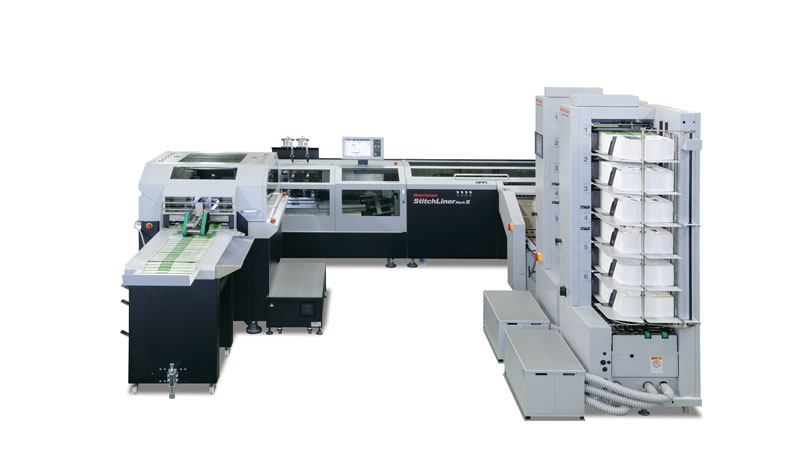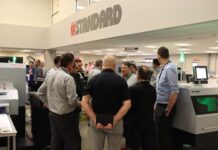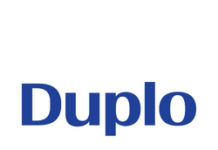by Lara Copeland, contributing editor
PostPress
Standard Finishing Systems, a North American distributor of print finishing and paper handling solutions based in Andover, Massachusetts, dates back more than 100 years. Partnering with equipment manufacturers to deliver solutions to many markets – including commercial, in-plant, trade bindery, quick print, data center, financial print, direct mail, forms, education and government – Standard offers a range of pre/post paper handling solutions from Hunkeler of Switzerland and a comprehensive line of automated finishing equipment from Horizon International of Japan. In addition to Horizon folders, perfect binders, trimmers, collators, bookletmakers, slitters/creasers and diecutters, Standard also offers Horizon saddlestitchers. The latest introduction in Horizon’s line of saddlestitchers is the Standard Horizon StitchLiner Mark III.
Standard’s Director of Marketing Don Dubuque stated that the Mark III “has been equipped with the latest in automation technology, including true end-to-end support for variable thickness production, a key innovation for personalized and short-run work.” The market requirements continue to evolve, and this system was designed to meet those ever-changing demands. “It improves on previous technology in virtually every way,” Dubuque offered. Featuring increased productivity up to 6,000 booklets per hour and expanded booklet size, the Mark III allows for the production of a wider range of applications, including landscape-size booklets, 12×12″ calendars and pocket booklets as small as 4.5×3.5″.
“As the market’s requirements for highly individualized short-run work continue to develop, the StitchLiner Mark III provides the tools to minimize changeover time and maximize efficiency,” Dubuque explained. From flat sheet collating, scoring, folding, and saddlestitching through three-knife trimming, all the system’s processes are managed through the fully automated set-up, which includes settings for stitch adjustment, so that stitch length and leg balance can be changed job-to-job or on the fly. At the trimmer, manual adjustments are not required for book thickness, and a unique 4-side jogging design achieves accurate trimming quality with 1-up or 2-up production.
Dubuque said that in order to keep pace with faster printers and the demand for quicker and quicker turnaround times, finishing equipment must have a blend of speed and versatility. “The StitchLiner Mark III’s automation technology allows for fast and easy set-up and changeover, as well as the application flexibility to take advantage of it. As the variety of customized, short-run work increases, the Mark III is uniquely outfitted to allow printers to eliminate bindery bottlenecks and meet those turnaround requirements,” he concluded.
Customers have welcomed this new saddlestitcher with praise. Dubuque mentioned that the reception has been “universally positive” from new customers and owners of previous Horizon saddlestitchers alike. “Our clients praise both the quality of the output as well as the speed and efficiency of the machine,” he said. “One Mark III customer reported that the system was running so fast that they had to put a second person on it to help unload, and that work that used to take six or seven hours was now being finished in less than two.” More positive feedback provides testimony to the fact that the machine is built to be durable. “The engineering of the machine ensures high uptime and a long life; we even had one customer tell us that after purchasing the Mark III, he considers himself set in saddlestitching for the next 15 years.”
Technical details:
The StitchLiner Mark III features speeds up to 6,000 booklets per hour, and it can produce and trim booklets up to 0.39″ thick with a maximum stitch thickness of 0.195″. It can process sheets between a weight range of 52.3 and 350 gsm.





